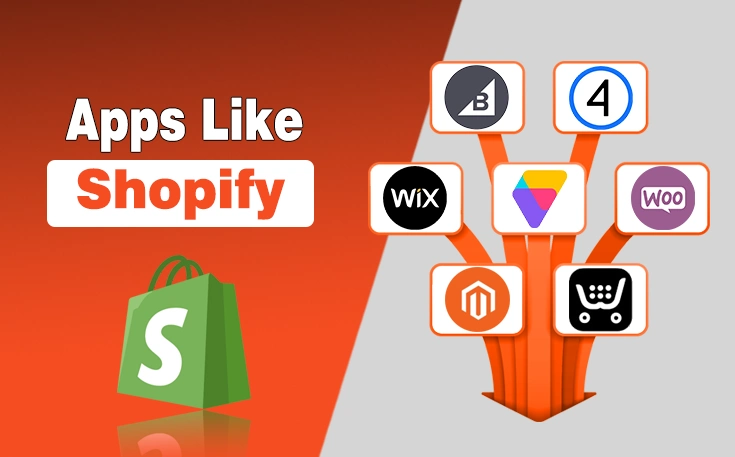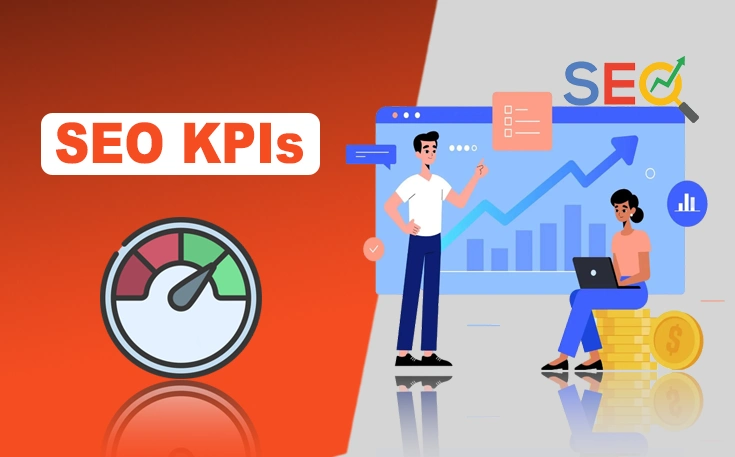Shopify is one of the most popular platforms for creating and running online stores. With more than 2 million merchants and a revenue of $8.88 billion in 2024, it’s clear that many businesses trust Shopify to sell their products online.
But Shopify isn’t the right fit for everyone. Some people want more control over how their store looks and works. Others are looking for lower costs or features that better match their business goals.
The good news? There are many apps like Shopify that offer similar tools—some with better pricing, easier customization, or unique features.
In this article, we’ll explore the top 15 Shopify alternatives to help you choose the best platform for your online store in 2025.
Let’s get started!
15 Top Shopify Alternatives for Online Stores in 2025
Here are the top 15 apps that can be the best Shopify alternatives for business seekers and professionals alike.
List of Best Shopify Alternatives/Apps Like Shopify
- BigCommerce: Ideal for scaling online businesses with e-commerce features.
- Wix eCommerce: Best for beginners looking for a user-friendly site-building.
- Squarespace: Best for elegant design templates and seamless integration.
- WooCommerce: Perfect for WordPress users seeking a customizable e-commerce plugin.
- Magento: Offers extensive customization and scalability for large e-commerce operations.
- Shift4Shop: Feature-rich platform suitable for growing businesses.
- Volusion: Provides comprehensive e-commerce tools with a focus on SEO.
- Ecwid: Offers easy integration with existing websites and various sales channels.
- Sellfy: Specializes in digital products and subscriptions with a simple setup process.
- PrestaShop: Open-source platform for customizable online stores.
- Salesforce Commerce Cloud: Enterprise-level solution integrating CRM and e-commerce.
- Nexcess StoreBuilder: Offers hosting solutions with an integrated e-commerce platform.
- Spree Commerce: Highly customizable open-source e-commerce solution.
- Weebly: Easy-to-use website builder with integrated e-commerce functionality.
- Zyro: AI-powered platform for creating and managing online stores with intuitive design tools.
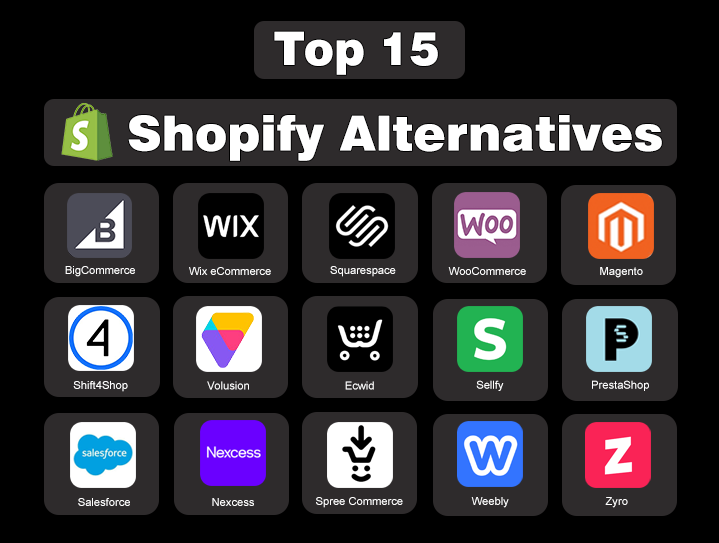
1. BigCommerce
BigCommerce is among the popular e-commerce alternatives to Shopify. It comes with many built-in features. These include SEO tools, multi-channel selling, and extensive customization options. It will not ask for any transaction fees and supports various payment gateways.
It stands out because of its native feature, and you don’t need many apps. The following tremendous platform is highly beneficial for scaling businesses. Moreover, you may discover built-in sales tools than Shopify. Also, you can easily sell across platforms like Amazon and eBay.
Key Features
- Built-in SEO and marketing tools.
- Multi-channel integration (e.g., Amazon, eBay, social media).
- No additional transaction fees.
Pros & Cons
| Pros | Cons |
|---|---|
| Scalable for large businesses | Limited free themes |
| A comprehensive set of built-in features | The steeper learning curve for beginners |
| Strong SEO capabilities |

2. Wix eCommerce
Wix is a user-friendly website builder and a great Shopify alternative. Renowned for its uniqueness, it is ideal for small businesses and creative minds who want an easy-to-use platform with drag-and-drop functionality.
Wix has all these qualities. If you’re a beginner and cannot learn hardcore coding skills, you can utilize Wix. The drag-and-drop design gives full control for content and design-focused sites.
If you are stuck between wix and Squarespace choice, here is our guide that may help you to choose the one that fits your needs: Wix vs Squarespace – Which is the Better Website Builder?
Key Features
- Variety of customizable templates.
- Drag-and-drop website builder.
- Integrated payment options.
Pros & Cons
| Pros | Cons |
|---|---|
| Intuitive Interface | Limited scalability for larger stores |
| Affordable pricing plans | Less advanced features |
| Extensive market app with added functionality |

3. Squarespace
Squarespace has sleek design templates, which are popular among creative minds and those running service-based businesses. In short, if you aim to sell both products and content, this platform is a great choice.
The combination of aesthetics and ease of use makes it stand out. With a strong focus on design and branding, the platform excels at selling digital content or services. While Shopify is primarily tailored for physical products, Squarespace seamlessly combines design, blogging, and e-commerce.
However, Squarespace is widely comapared with wordpress, so we have also compare both to keep informed our reader, you can read: Squarespace vs WordPress- Which Is Best for Blogging?
Key Features
- Award-winning design templates.
- Built-in blogging and SEO tools.
- Integrated e-commerce capabilities.
Pros & Cons
| Pros | Cons |
|---|---|
| Eye-catching templates | Limited payment gateway options |
| Has all features for content and commerce | Less suitable for large-scale e-commerce operations |
| Responsive customer support |

4. WooCommerce
WooCommerce is a customizable, open-source e-commerce plugin for WordPress. If you know how to work with WordPress, it can be a real treat for you and your business. It provides flexibility and comes with numerous extensions.
Therefore, it becomes easy to tailor your online store to specific needs. The following Shopify alternative gives full control, which makes it different from Shopify’s hosted model. You own your site and data. To summarize, if you want in-depth customization and a cost-effective solution, consider WooCOmmerce.
Key Features;
- Seamless integration with WordPress.
- Extensive library of plugins and themes.
- Support for various payment gateways.
Pros & Cons;
| Pros | Cons |
|---|---|
| Highly customizable | Requires WordPress |
| Large community support | Maintenance and updates are user responsibilities |
| Cost-effective for small businesses | |
| Requires WordPress knowledge. |

5. Magento (Adobe Commerce)
Magento is now known as Adobe Commerce, another powerful e-commerce platform. Large businesses have complex needs, and Magento is there to manage such hard things. It has customization and scalability options, along with a wide range of features.
Needless to say, all these qualities make it an ideal solution for enterprises with dedicated development teams. HIghly useful for those catering to large and complex stores. You can handle advanced features like bulk pricing and B2B tools, which makes it an amazing Shopify alternative. You’ll need developers because the platform offers a high level of flexibility.
Key Features
- Robust SEO and marketing tools.
- Advanced product management.
- Scalable architecture for extensive catalogues.
Pros & Cons
| Pros | Cons |
|---|---|
| Easy to customize and scalable | Requires technical know-how |
| Strong community and enterprise support | Development and maintenance costs are high |
| Comprehensive features to handle complex operations |
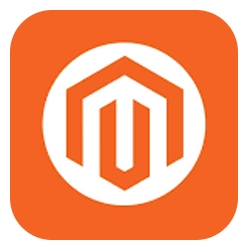
6. Shift4Shop
Shift4Shop was formerly known as 3dcart. Listed among the most impressive platforms since it comes with built-in tools. This impressive app is best for businesses seeking a comprehensive solution without relying heavily on third-party apps.
The platform has various customization options. Hence, it can suit different building models. Plus, if you use Shift4 Payments, the platform is completely free for U.S. merchants. That’s a huge benefit for businesses trying to keep costs low. All in all, this platform is ideal for sellers who want more control, flexibility, and a feature-rich backend without extra charges.
Key Features
- Multiple payment and shipping integrations.
- Built-in SEO and marketing tools.
- Easy-to-customize templates and themes.
Pros & Cons
| Pros | Cons |
|---|---|
| Extensive built-in features | The interface is not easy for beginners |
| No transaction fees | Limited third-party app marketplace |
| Suitable for various business sizes |

7. Volusion
Volusion is an all-in-one e-commerce platform for small to medium-sized businesses. Some popular features are inventory management, payment processing, and marketing tools. All this is available within a user-friendly interface. Merchants can easily create and manage the stores with responsive themes and a built-in site editor.
If you want simplicity and built-in tools like Shopify, you can explore Volusion. Packed with great analytics, product management, and marketing tools all in one place. Unlike Shopify, which often depends on third-party apps for more advanced functions. Overall, it is useful for store owners who want less complexity and more direct control over their online operations.
Key Features
- Built-in SEO tools.
- Responsive and customizable themes
- Integrated payment with multiple gateway options.
Pros & Cons
| Pros | Cons |
|---|---|
| A comprehensive set of built-in features | Limited scalability for growing businesses |
| Better profit margins | No built-in blogging feature |
| On-the-go store management with mobile app option |

8. Ecwid
Ecwid is a great e-commerce solution as it facilitates adding an online store to any website or social media page. Highly beneficial for those wanting to expand their online presence without building a new site.
With this, you can turn any site — WordPress, Wix, Weebly, or even a Facebook page — into a full online store. It’s affordable, flexible, and super easy to integrate. The free plan makes it attractive for startups, and the paid tiers add advanced tools without high monthly costs. If you’re not ready to move to a full platform like Shopify, with Ecwud, you can start selling products faster.
Features
- Support for multiple payment gateways.
- Seamless integration with existing websites and platforms like WordPress, Wix, and Facebook.
- Mobile-responsive design
Pros & Cons
| Pros | Cons |
|---|---|
| Easy to setup | Little customization |
| Free plan with basic features | A paid subscription is a must for advanced features |
| Multi-channel selling capabilities |

9. Sellfy
Sellfy is an e-commerce platform for creative minds and digital product sellers. It lets users easily sell digital downloads, subscriptions, and physical products. Sellfy’s straightforward interface and built-in marketing tools make it a good option for artists, writers, and musicians.
The remarkable platform handles everything — from hosting to payments — and also includes built-in marketing tools like email campaigns and discount codes, unlike Shopify, which is more focused on physical goods and may feel too big or technical for creatives.
Key Features
- Subscription and pay-what-you-want pricing models.
- Integrated email marketing and discount codes.
- Digital product delivery through secure file hosting.
Pros & Cons
| Pros | Cons |
|---|---|
| User-friendly setup | Limited design customization options |
| No transaction fee on paid plans | Not ideal for large-scale physical product inventories |
| Built-in marketing tools |

10. PrestaShop
PrestaShop is an open-source e-commerce solution. With a large community and a wide range of modules, PrestaShop suits businesses seeking a tailored online store experience since the platform has extensive customization for developers and tech-savvy users.
As an open-source platform, it gives you full access to the code. Besides, developers can tailor everything to exact specifications. While Shopify is easier to use, the former is more flexible for those who want full control and don’t mind getting hands-on with development.
Key Features
- Open-source platform with access to source code.
- Extensive library of add-ons and themes.
- Multi-language and multi-currency support.
Pros & Cons
| Pros | Cons |
|---|---|
| Highly customizable as per business needs | Technical knowledge is a must-have |
| Strong community support | Additional cost for some modules and themes |
| No licensing fee for core software |

11. Salesforce Commerce Cloud
Salesforce Commerce Cloud is a top choice for large businesses with complex needs. It offers AI-powered tools to personalize customer experiences and drive higher conversions. The platform is known for handling both B2C and B2B sales efficiently.
Businesses that require robust integration with CRM, marketing, and sales tools find it ideal. For businesses growing rapidly, it offers the scalability that Shopify lacks. Highly useful for enterprises looking to centralize their e-commerce and customer data.
Key Features
- AI-powered product recommendations.
- Personalization tools to enhance customer experience.
- Integration with Salesforce CRM and marketing tools.
- Highly scalable for enterprise-level businesses.
Pros & Cons
| Pros | Cons |
|---|---|
| Powerful AI and personalization tools | High cost, best for large businesses |
| Seamless integration with Salesforce tools | Requires dedicated IT and support teams |
| Scalable for complex and global operations |

12. Nexcess StoreBuilder
Nexcess StoreBuilder is an easy-to-use e-commerce platform built on WooCommerce. Specifically designed for users who want the flexibility of WooCommerce without managing the technical side.
The platform combines AI-driven optimization and managed hosting. It is useful for businesses that want full control over their store without the hassle of maintenance. It is considered a remarkable alternative to Shopify for store owners who need flexibility but don’t want to deal with hosting setup and updates.
Key Features
- AI-powered tools to boost store performance.
- Managed WooCommerce hosting for easy setup.
- Built-in performance optimization for fast loading times.
- Customizable themes and design options.
Pros & Cons
| Pros | Cons |
|---|---|
| Fully managed hosting with WooCommerce | Limited features for very large enterprises |
| AI-powered tools to help optimize store | Pricing can be higher than basic platforms |
| Seamless integration with Liquid Web |
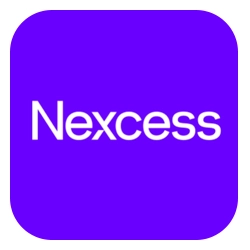
13. Spree Commerce
Spree Commerce is an open-source e-commerce platform that provides full control and customization. Perfect for developers who need a highly flexible solution. The open-source nature allows for in-depth customization, which Shopify cannot offer.
Regardless of the activity you need to perform, whether you want to create custom workflows or integrate with unique systems, it provides the flexibility you need. Developers can modify every aspect of the store. All in all, if you aim to build a completely unique and scalable e-commerce platform, Spree Commerce would suffice for you.
Key Features
- Fully customizable and open-source.
- Extensive API for integration with other systems.
- Multi-store and multi-language support.
- Strong community support and plugins.
Pros & Cons
| Pros | Cons |
|---|---|
| Full customization with open-source code | Requires technical expertise to set up and maintain |
| Ideal for developers who need flexibility | Not as user-friendly for beginners |
| Strong community support and plugins | Can become costly with advanced customizations |

14. Weebly (by Square)
Weebly (by Square) is an intuitive and user-friendly website builder that includes e-commerce features. If you own a small business or want to set up local shops, with the help of the following tool, you can quickly set up an online store.
Reliable apps like Shopify are helpful if you don’t need a complex system. Its simplicity allows store owners to focus on running their business instead of dealing with technical aspects.
If you want a low-cost and easy-to-use platform to create a store, Weebly is best Shopify alternatives since it integrates seamlessly with Square for payments. Shopify may be better for larger operations, but Weebly is excellent for those who want a simple and quick online presence.
Key Features
- Drag-and-drop website builder for easy customization.
- Integrated Square payment processing for simple transactions.
- Built-in SEO and marketing tools.
- Mobile-optimized themes and templates.
Pros & Cons
| Pros | Cons |
|---|---|
| Easy to use for beginners | Limited scalability for large businesses |
| Affordable pricing for small businesses | Less flexibility compared to more advanced platforms |
| Integrated with Square for payments | Basic e-commerce features compared to others |

15. Zyro
Considering efficient apps similar to Shopify, Zyro is another big name. It is an AI-powered website builder that includes e-commerce features. Their intuitive interface and AI-powered tools help create professional-looking stores quickly, which makes it a fantastic Shopify alternative.
The AI tools for content generation and design suggestions make it easy to start. Shopify may offer more features, but Zyro stands out among Shopify alternatives for small businesses that want to launch fast and focus on creating an outstanding store. Ideal for entrepreneurs who want a low-cost option without struggling with the complexity of other platforms.
Key Features
- AI-powered tools for design and content.
- Easy-to-use drag-and-drop interface.
- Built-in SEO and marketing tools.
- Mobile-optimized templates for a professional look.
Pros & Cons
| Pros | Cons |
|---|---|
| Super easy to use with AI tools | Limited features for larger, complex stores |
| Affordable pricing with great templates | Less customization compared to other platforms |
| Quick setup for entrepreneurs | No app marketplace for added functionalities |

Final Thoughts
As the e-commerce world grows in 2025, it’s a great time to explore apps similar to Shopify. No matter, if you’re a beginner looking for a simpler setup or an established brand needing more flexibility, the right platform is out there.
These Shopify alternatives listed above come with their strengths. Some are perfect for customization, others are more budget-friendly, and a few focus on creative side or scalability.
It comes down to what fits your business best. Try out a few options, explore the features, and see what makes your workflow smoother. Switching platforms doesn’t mean starting from zero—it just means moving towards what works smarter for your brand.
We hope this blog helps you find the right Shopify alternative to build, manage, and confidently grow your online store.
FAQs (Frequently Asked Questions)
1. What are the best alternatives to Shopify in 2025?
Some top Shopify alternatives include BigCommerce, WooCommerce, Squarespace, Wix, and Ecwid. Each offers features like online store setup, payment integration, and marketing tools. The best one depends on your business size and technical needs.
2. Which Shopify alternative is best for small businesses?
Wix and Squarespace are great for small businesses due to their ease of use and all-in-one solutions. They come with templates, hosting, and basic e-commerce tools, making them ideal for beginners.
3. Are Shopify alternatives more affordable?
Yes, many platforms offer free plans or lower monthly costs than Shopify. WooCommerce is free to start (with WordPress), while platforms like Shift4Shop and Ecwid offer budget-friendly plans for small sellers.
4. Can I switch from Shopify to another platform easily?
Most platforms allow store migration from Shopify. Tools or plugins can help transfer products, customer data, and orders. However, some technical work may be needed depending on the new platform.
5. Which alternative works best for digital products?
Sellfy and WooCommerce are excellent for selling digital downloads like eBooks, courses, or music. They provide features like secure file delivery, licensing options, and recurring payments.

